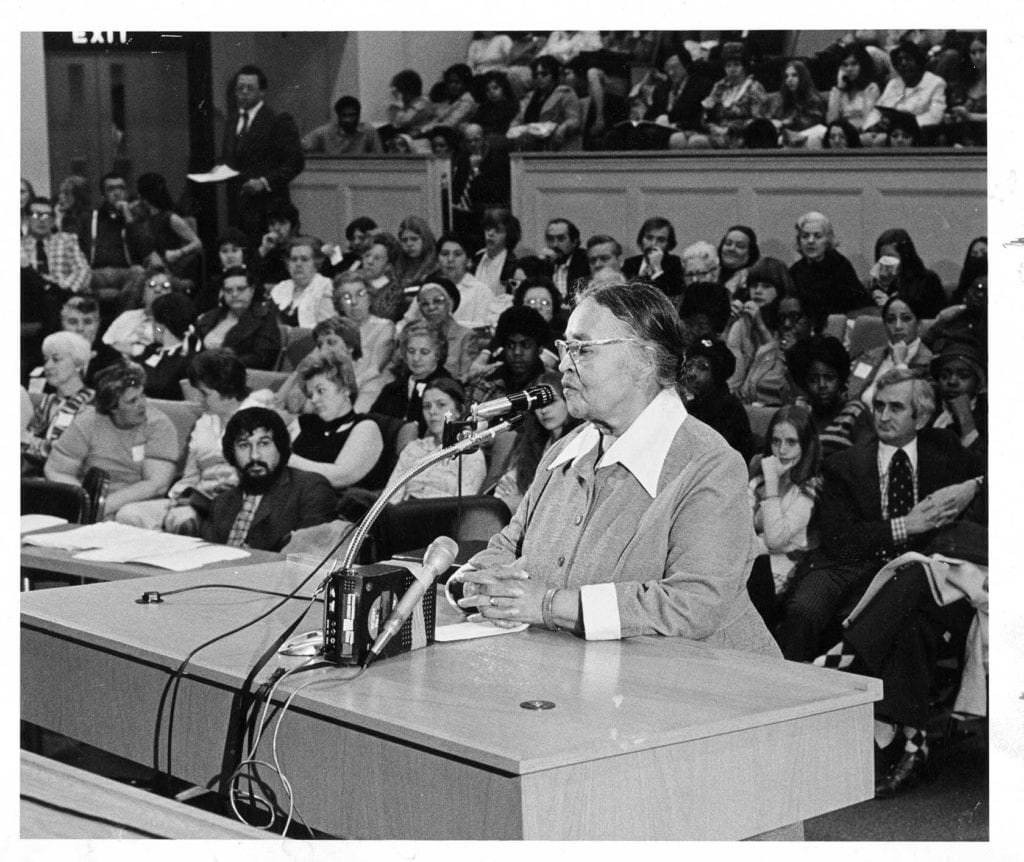Women’s History: Who was Melnea A. Cass?
From humble beginnings, Cass rose to become a pillar in Boston’s black community with life of service

In the 1920s, the Cass family moved to Roxbury. With her husband Marshall’s support, Melnea A. Cass began what would be a long career as a volunteer community activist for human rights.
It was in the 1930s that Cass began a lifetime of volunteer work on the local, state and national level. She first contributed her services to the Robert Gould Shaw House, a settlement house and community center. She was the founder of the Kindergarten Mothers. Her community activities over the years were numerous and varied. She was a member of the Pansy Embroidery Club, Harriet Tubman Mothers’ Club and the Sojourner Truth Club. She also worked at the Northeastern Region of the National Association of Colored Women’s Clubs as a secretary and helped form the Boston local of the Brotherhood of Sleeping Car Porters.

Melnea Cass shares the podium with Franklin D. Roosevelt, Jr. and Lena Saunders during a senior citizens meeting in Roxbury. BANNER FILE PHOTO
During World War II she was one of the organizers of Women In Community Service, which later became Boston’s sponsor of the Job Corps. In 1949 she was a founder and charter member of Freedom House, which was conceived by Muriel and Otto Snowden. A year later, she was appointed as the only female charter member to Action for Boston Community Development, which assisted people who lost their homes to urban renewal efforts. From 1962 to 1964, Cass was president of the Boston branch of the National Association for the Advancement of Colored People. From 1975 to 1976, Cass was chairperson for the Massachusetts Advisory Committee for the Elderly.
Her other community activities are too numerous to mention. Cass was always at the forefront of making opportunities for the improvement in the quality of life for blacks in Boston. Melnea Cass Boulevard in Boston’s Roxbury neighborhood bears her name along with Melnea Cass Metropolitan District Commission Swimming and Skating Rink dedicated by Gov. John Volpe.
May 22, 1966 was declared Melnea Cass Day. Generations of black Boston schoolchildren recall her practice of giving them money upon their school graduations.
She also received honorary doctorates from Northeastern University (June 15, 1969), Simmons College (May 15, 1971) and Boston College (1975).
Cass died in 1978. The Rev. Michael Haynes remarked in his eulogy, “The Holy Word asked, ‘who can find a virtuous woman?’ We have found her — in a modestly furnished third-floor walk-up tenement flat on Harold Street in Roxbury, Massachusetts, where a beautiful, radiant, strong, courageous, generous, God-loving Christian black woman named Melnea A. Cass held court around a quaint, old-fashioned dining room table.”
The Bay State Banner wrote in 1978, “The most important lesson Mrs. Cass taught us was love. Her abiding goodwill permeated everything she did. Even her adversaries would come away feeling good. Problems and hostilities would melt when faced with the force of her love.”







